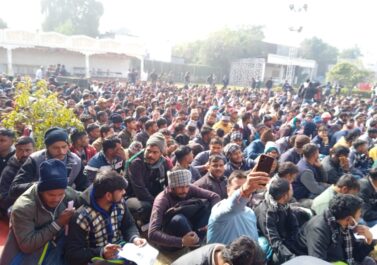(Edited translation from ‘Liberation’, 9th of February 2017)
We translated some of the interviews with retail workers in France, focussing on the question of automatisation.
*** Yves, 42 years old, employed at IKEA
I work for IKEA since 2000, in a store in the region of Paris. After my BTS (graduation with a technician diploma) I chose to start working there. When I was a customer at IKEA I thought it would be cool working there. During my studies I had worked in a fast-food chain, then in a theme park.
Nowadays there are quite a lot of automatic check-out points. There customers prefer them, because they don’t want to wait queuing up. It is more than likely that these self-check-outs become more widespread, but then I think that the general trend goes towards a system with magnetic senders attached to each article: the customer will move their trolley through a receiver system which automatically calculates the total price to pay. This might pose the problem of traceability, in the sense that these senders would stay in the articles and will still be detectable when at the customers’s home. Therefore it is likely that some people will still be employed at the check-outs to remove these electronic senders – but their work would be different from our work now.
On weekdays we normally open two, three normal check-outs and two, three automatic ones. At the normal check-outs those customers who bought many items have to wait a long time – mainly because management does not want to hire more cashiers to be able to open more check-outs. They want to force the customers to chose the ‘fast check-outs’, even if they have 30 items to self-check-out. In some stores one worker has to supervise six self-check-outs, with six screens. This is really stressful, in particular during weekends, when it’s jam-packed and noisy. If you do this job for eight hours on a weekend you will sleep like a log afterwards, I guarantee you. Often the customers become pretty angry when things don’t work out like they want – it is difficult to keep them under control. management doesn’t trouble us regarding theft, because that’s the job of the security gaurds to check the receipts and stuff.
I usually work at the check-out, because this is usually the vacant job position. I stay in the job, because if I would apply for a different job within the store I would lose my job security. I work 27 hours on average, because I chose not to work more. I earn 1,200 Euro after tax per month, including bonuses. On Sundays you are paid double. During the last 17 years the total work-force has been halved, even if there are now also many people working part-time.
*** Aurore, 46 years old, employed at Carrefour
The big supermarket in the region of Toulouse where I work employs around 100 cashiers, out of a total workforce of 400. Many of them are students, The supermarket opens on seven Sundays per year – for the bank holidays, the end of the year, the return to school.
On the technological level things are much better now. We have check-outs with touch-screens. But on the physical and mental level, things are much harder: there are much fewer of us doing the same amount of work. At the check-out you never get a free moment, there is always a queue. In the rare case that there is no customer they re-direct customers from other check-outs in order not to make them wait. They don’t want to pay us for sitting idle. At peak-times I work five hours continuously before being able to take a five minutes break.
And in terms of progress or technological evolution? I don’t know. Because in some stores they have removed the self-check-outs again. The customers complained about a lack of communication and there has also been an increase in theft. Finally, the problem in our profession is the respect that we get or don’t get from the customers.
I am employed on a part-time contract of 31 hours, which I haven’t chosen. I would like to work more, but that is not possible at the check-outs. You would have to work stacking shelves, which I don’t want to do. Many of my colleagues have the same problem. The other option would be to work very flexibly at the check-outs, meaning, working in the morning and then returning in the evening, if needed. With a big gap in your day. This is not my type of life, but management leaves you no other option.
I have a BAC +3 [A-level plus three years of university], I started working here during my studies. As I didn’t find a job after graduation, I stayed here. Then I had my girls. I always had Wednesdays off in order to have more time for them. I make loads of money, four digits per month! This is 1,025 after tax. Minus 52 Euro for the pension fund. I receive two month wages per year as bonus, plus six and a half weeks paid holiday. As people don’t want to wok on bank holidays management has also stopped asking us to work on Sundays – also because this is paid triple. Or alternatively double pay, plus one extra day off per week.
*** Marie, 36 years old, employed at Auchan
I work for Auchan in Hauts-de-France, for seven years now. When I started working as a cashier it was definitely a job ‘by default’, because there was nothing else available. I have a qualification, but there were no jobs in the sector. I was hired on a temporary contract in the tech-department, but my bosses, who appreciated my work, got me a permanent job at the check-outs.
It changed our job when they introduced the automatic self-check-outs for ten items or less. You don’t have the same relationship with the customers. You assist them, when needed. But don’t be fooled: management has reduced the number of cashiers in order to move the clients with fewer items towards the automatic check-outs.
I started working 30 hours per week, most of the time in the home appliances department, around 25% of the time at the check-out. Then sales in the department went down and I moved to the check-out completely. When I started I earned just under 1,000 Euro per month. I asked them many times to give me a full-time position, but they refused. management says that the work is too hard and that 35 hours are impossible without endangering your health. It is more likely that they don’t increase my hours because I finish at 21:30 and from 22:00 onwards they would have to pay night-shift bonus.
The job can be annoying, the clients aggressive and all, but I always manage to find a positive aspect. Even if you have to admit that the job is too repetitive. In terms of the future of the job – that is a difficult one. There is what they call ‘individual wage assessment’, depending on our supervisor who evaluates our performance: efficiency (number of items per minute), fluidity (how long does it take to serve one customer) and rapidity (time between payment of customer and serving the next customer). This program has been put in place two years ago. It has caused a lot of bad blood. I had repetitive strain syndrome and back problems. My colleagues developed chronic fatigue and exhaustion syndromes. You just get stressed out.
I don’t want to stay in the job anymore. But most of my colleagues want to or have to. My colleagues who are 45 years old or older are proud of what they are doing. The younger ones see it more as a temporary solution.



